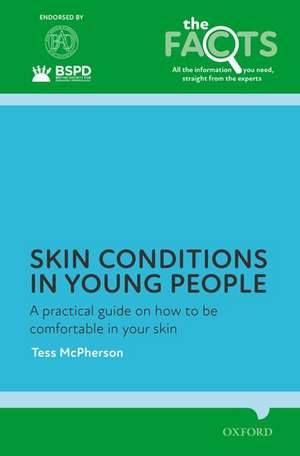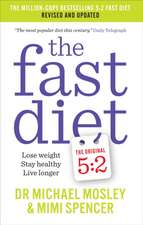Skin conditions in young people: A practical guide on how to be comfortable in your skin: The Facts Series
Autor Tess McPhersonen Limba Engleză Paperback – 23 sep 2021
Preț: 88.27 lei
Preț vechi: 113.03 lei
-22% Nou
Puncte Express: 132
Preț estimativ în valută:
16.89€ • 17.63$ • 13.98£
16.89€ • 17.63$ • 13.98£
Carte disponibilă
Livrare economică 04-10 martie
Preluare comenzi: 021 569.72.76
Specificații
ISBN-13: 9780192895424
ISBN-10: 0192895427
Pagini: 176
Dimensiuni: 130 x 195 x 10 mm
Greutate: 0.2 kg
Editura: OUP OXFORD
Colecția OUP Oxford
Seria The Facts Series
Locul publicării:Oxford, United Kingdom
ISBN-10: 0192895427
Pagini: 176
Dimensiuni: 130 x 195 x 10 mm
Greutate: 0.2 kg
Editura: OUP OXFORD
Colecția OUP Oxford
Seria The Facts Series
Locul publicării:Oxford, United Kingdom
Recenzii
Adolescence is a time of transition from childhood to adulthood during which there are rapid changes in physical, social, and emotional development. Coping with the onset of skin disease during this vulnerable time can be difficult. This is an excellent and much needed resource to support adolescents with skin disease by providing reliable information on common issues, addressing some of the myths around skin disease and promoting emotional wellbeing. An essential read for adolescents with skin disease and for the people who look after them.
The impact of skin diseases on people's lives can be profound due to their public visibility, commonly causing distress, anxiety, and embarrassment. Yet treatments mostly focus on the physical aspects, often neglecting the impact on our mental health. This is an excellent, much needed, and accessible book written with young people and the common skin problems they encounter in mind, easy to understand yet comprehensive and holistic in its approach.
A must-read for young people living with a skin condition and their families. This book provides clear and up-to-date information on a wide range of conditions while acknowledging their potential psychological and social impact on life. A highlight of the book, the final section, offers compassionate advice about living better, covering some crucial aspects of physical and mental health relevant to the reader. Each chapter shares a powerful message of hope and optimism, which young people struggling to cope with their skin condition desperately need.
Skin conditions in young people includes a fantastic guide to our skin condition, offering practical, achievable advice on managing your vitiligo and its impact on you. We were pleased to contribute to this book, which will help give young people the confidence to live comfortably in their vitiligo skin.
Skin conditions in young people embodies the values of both The Dipex charity and healthtalk.org. By understanding a health condition holistically, both young patients and health professionals are better able to understand the wider impact of issues such as skin conditions and improve experiences and care.
I found it very useful, especially the final section about the mental side of skin conditions. I felt that I could relate to quite a few things in the book and it has helped me to cope with my scarring and speak to my parents more about the things I have been worrying about.
I found this so useful- it was information that had never been explained to me well. I am now managing my eczema so much better.
I liked the simple message about eczema not being your fault, and that sometimes it will flare for no reason. It's better not to drive yourself crazy trying to work out why it flared, but to just focus on getting on top of it and trying to not let it stop you doing the things you enjoy.
The HS chapter actually made me feel a bit better about the condition, especially in terms of feeling 'dirty'.
Straight away I read the section 'Living in your skin'. This is something that I know I struggle with regardless of the fact that other people have far more severe psoriasis than me. Reading through it, I found that I have experienced so many of the feelings referenced. The typical 'Why me' is a really common thought. Another is that I would feel happier without psoriasis. This is hard to deal with as it's very difficult to control. But knowing more ways to tackle these thoughts is useful. This was great to read and seemed to be really in line with feelings that I've experienced for a while.
The impact of skin diseases on people's lives can be profound due to their public visibility, commonly causing distress, anxiety, and embarrassment. Yet treatments mostly focus on the physical aspects, often neglecting the impact on our mental health. This is an excellent, much needed, and accessible book written with young people and the common skin problems they encounter in mind, easy to understand yet comprehensive and holistic in its approach.
A must-read for young people living with a skin condition and their families. This book provides clear and up-to-date information on a wide range of conditions while acknowledging their potential psychological and social impact on life. A highlight of the book, the final section, offers compassionate advice about living better, covering some crucial aspects of physical and mental health relevant to the reader. Each chapter shares a powerful message of hope and optimism, which young people struggling to cope with their skin condition desperately need.
Skin conditions in young people includes a fantastic guide to our skin condition, offering practical, achievable advice on managing your vitiligo and its impact on you. We were pleased to contribute to this book, which will help give young people the confidence to live comfortably in their vitiligo skin.
Skin conditions in young people embodies the values of both The Dipex charity and healthtalk.org. By understanding a health condition holistically, both young patients and health professionals are better able to understand the wider impact of issues such as skin conditions and improve experiences and care.
I found it very useful, especially the final section about the mental side of skin conditions. I felt that I could relate to quite a few things in the book and it has helped me to cope with my scarring and speak to my parents more about the things I have been worrying about.
I found this so useful- it was information that had never been explained to me well. I am now managing my eczema so much better.
I liked the simple message about eczema not being your fault, and that sometimes it will flare for no reason. It's better not to drive yourself crazy trying to work out why it flared, but to just focus on getting on top of it and trying to not let it stop you doing the things you enjoy.
The HS chapter actually made me feel a bit better about the condition, especially in terms of feeling 'dirty'.
Straight away I read the section 'Living in your skin'. This is something that I know I struggle with regardless of the fact that other people have far more severe psoriasis than me. Reading through it, I found that I have experienced so many of the feelings referenced. The typical 'Why me' is a really common thought. Another is that I would feel happier without psoriasis. This is hard to deal with as it's very difficult to control. But knowing more ways to tackle these thoughts is useful. This was great to read and seemed to be really in line with feelings that I've experienced for a while.
Notă biografică
Dr Tess McPherson is Consultant Dermatologist, Senior Clinical Lecturer & Clinical Lead for Paediatric and Adolescent Dermatology at Oxford University Hospitals where she has established an award-winning service with psychological support for adolescents with skin conditions. Dr McPherson has also worked with the World Health Organisation (WHO) in South America, the Weatherall Institute of Molecular Medicine (WIMM), the National Institutes of Health (NIH) in Washington, D.C. and Birmingham's Children's Hospital. Dr McPherson is active in national and international paediatric dermatology including elected secretary (President-elect) of the British Society of Paediatric Dermatology (BSPD), developing clinical guidelines and patient information for the British Association of Dermatology (BAD), monitoring of medications in children and young people (BADBIR registry), lead clinician for a web-resource for young people (healthtalk.org) and work with charities and patient groups.


















